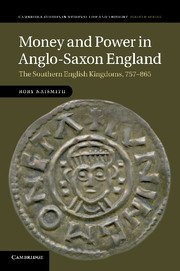Book contents
- Frontmatter
- Contents
- Figures
- Maps
- Tables
- Acknowledgements
- Abbreviations
- Chapter 1 Introduction
- Chapter 2 Money in its political context
- Chapter 3 Looking at coinage: iconography and inscriptions
- Chapter 4 Authority and minting I: the king
- Chapter 5 Authority and minting II: mints, die-cutters and moneyers
- Chapter 6 Value judgements: weight and fineness
- Chapter 7 Production of coinage
- Chapter 8 The circulation of coinage
- Chapter 9 The nature of coin-use in the early Middle Ages
- Chapter 10 Conclusion
- Bibliography
- Index
- References
Chapter 4 - Authority and minting I: the king
Published online by Cambridge University Press: 07 October 2011
- Frontmatter
- Contents
- Figures
- Maps
- Tables
- Acknowledgements
- Abbreviations
- Chapter 1 Introduction
- Chapter 2 Money in its political context
- Chapter 3 Looking at coinage: iconography and inscriptions
- Chapter 4 Authority and minting I: the king
- Chapter 5 Authority and minting II: mints, die-cutters and moneyers
- Chapter 6 Value judgements: weight and fineness
- Chapter 7 Production of coinage
- Chapter 8 The circulation of coinage
- Chapter 9 The nature of coin-use in the early Middle Ages
- Chapter 10 Conclusion
- Bibliography
- Index
- References
Summary
‘A special, but very solid, demonstration of the English state is the coinage.’ Thus wrote James Campbell, one of several historians in recent times who have quite rightly emphasized the remarkable unity and sophistication of the late Anglo-Saxon monetary system. It stands in stark contrast to the currency of late Carolingian and early Capetian France, or that of Ottonian and Salian Germany, where in both cases power over minting had passed into the hands of a plethora of secular and ecclesiastical magnates. Almost every mint had its own distinct coinage. In the whole kingdom of England, there was only one. As Campbell observed, this contrast in monetary history has been used as one benchmark of royal authority in a more general sense. The frequent reforms and nation-wide standardization instituted by Edgar towards the end of his reign brought into being the ‘gold standard’ of early medieval royal coinages, at the same time as other – though often less clearly traceable – developments in government and kingly representation were building momentum.
In essence there is no disputing this special place which coinage occupies in the armoury of sources available to the early medieval historian. It survives in relative quantity and consistency from diverse parts of the kingdom, and gives an important insight into one sphere of society and government which usually operated separately from that responsible for chronicles, charters and most other raw materials of early medieval history. At the same time, numismatists should be under no illusions about the importance of coinage. In the grand scheme of things coinage was a relatively minor part of a kingdom’s administration, at least as long as it was broadly meeting expectations. Insignificance is in one sense, however, a virtue. Substantive changes in the coinage are unlikely to have been isolated phenomena and hint at more general enterprises which once touched on many other, now lost, media. If this is what could be accomplished with coins, the argument goes, how far could the same arrangements have extended into other areas?
- Type
- Chapter
- Information
- Money and Power in Anglo-Saxon EnglandThe Southern English Kingdoms, 757–865, pp. 87 - 127Publisher: Cambridge University PressPrint publication year: 2011



